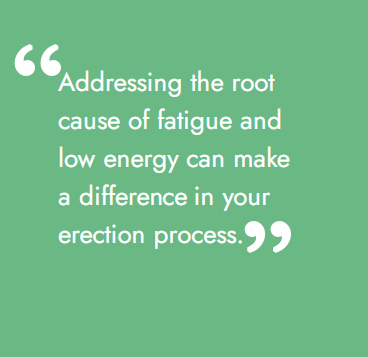
Erectile dysfunction is often thought of as a condition impacting older men only. Nothing could be further from the truth. Young men in their 20s and 30s experience erectile dysfunction at surprisingly high rates. These numbers seem to be climbing.
New data suggests that up to 1 in 4 men under age 40 will deal with erectile dysfunction at some point. With many years ahead of them, young men stand to benefit from addressing ED sooner rather than later.
Many men will face a problem gaining or maintaining an erection occasionally. This is normal and is generally not indicative of erectile dysfunction. If a man does not put a lot of emotional energy and worry about the incident – it will likely end there.
Erectile dysfunction is complex and comes in a variety of forms. Men can suffer problems gaining or maintaining an erection as well as changes in rigidity. It can happen every time or from time to time. Many young men can gain and maintain an erection when they are alone, or masturbating, but they struggle with erections when with a partner.
The Myth of ED and Age
There are two common sexual myths about age:
- Young men should always be ready for sex and achieve an erection on demand.
- Erectile dysfunction is something that only happens to older men.
It is true that as men age several health issues that impact erections become more common. Organic erectile dysfunction is more likely to be the primary cause of ED for older men and these men benefit most from modern medical interventions like medications.
This may be why ED is commonly associated with old age. Most ED medications are marketed to older men. ED occurrence does increase with age, but it is also common in young men.
Try our eCourse: "The Thinking Man’s Guide to Understanding and Addressing ED"
Causes of ED in Young Men
The mind plays a significant and often underappreciated role in erections. For young men in their 20s and 30s, erectile dysfunction is likely caused by their thinking, feelings or relationships.
The overwhelming majority of young men are physically healthy and do not experience organic-based erectile dysfunction. However, some young men will have medical issues and any man facing ED consistently should seek medical attention to rule out any physical causes.
Stress
Whether you are a student, employed, in a relationship, or single, life is stressful. High levels of stress can impact sexual interest and sexual performance. Some men do not feel any interference with sex when they are stressed but many men do.
Stress can also hide in the subconscious regions of the brain. People can experience stress without actually feeling or noticing it. People often utilize a series of coping mechanisms and safety behaviors that allow the underlying stress to go undetected. This unnoticed stress can be a factor in ED as well.
Depression

Depression is a very common mental health condition. Everyone feels down and sad at times. That is completely normal. When these feelings persist for long periods of time, a pattern of depression may emerge.
Depressive signs include decreased energy, lack of motivation and loss of pleasure. Each of these symptoms can impact sexual desire, a key factor in healthy erections.
Depression also directly impacts how people think. Even when a man feels desire for sexual activity, depressive thoughts can interfere with the erection process causing decreased blood flow to the penis. This may result in erectile dysfunction.
People experiencing depression also struggle with self-esteem and confidence. Sexual activity can become challenging when a man does not feel good about himself.
Low desire
Low sexual desire is common for men in their 20s and 30s. This comes as a surprise to many people. Low sexual desire is not the same as low testosterone. There are many men who have normal testosterone levels or use testosterone replacement and struggle with low libido.
Desire is a complex process unique to each person. For most men, this issue can be addressed to a satisfactory degree. This can allow for a healthy sexual relationship with yourself and with a partner. Low sexual desire can be a significant factor contributing to erectile dysfunction in young men.
Porn
Use of pornography is extremely common. For younger men growing up in the internet age, access to porn is as simple as a decent Wi-Fi connection.
Watching porn is becoming a part of life for millions of people and the impact on sexual development and sexual function remain to be seen. Young men often have an ability to gain strong erections while watching porn but may struggle with a partner.
The role of porn in erectile dysfunction is unclear and is probably specific to each man and the circumstances of his erectile dysfunction.
Masturbation
Generally speaking, masturbation should not be a cause for erectile dysfunction. For young men, masturbation is a normal and healthy act. Masturbation is most likely a scapegoat or easy target of blame for ED. It is more likely that other issues are contributing to erectile dysfunction.
Negative Sexual Experiences
A negative sexual experience can trigger erectile dysfunction. Most young men don’t realize that not all sexual experiences will go well. Sex can be unsatisfying and frustrating. Whether it is experiencing rapid ejaculation, a disappointed partner, or loss of interest during sex, something less than perfect is likely to occur from time to time.
A common fear for young men is whether a partner will tell someone about “bad sex” or the way he performs. In the world of dating apps and social media there is an increased possibility that this will occur, and it can plague the mind. Insecurities in a sexual encounter or relationship can create worry, fear, and anxiety leading to erectile dysfunction.
Performance anxiety

Many men are starting partnered sexual activity in their late teens and 20s. Partnered sex can be fret with anxiety. Men often hold themselves to high or unrealistic standards that create unneeded pressure. The truth is most people do not know how to be great sexual partners without practice and developing skills.
This often leads to the development of performance anxiety, a common cause of erectile dysfunction in young men.
There are often misconceptions about how a partner experiences sexual satisfaction. Most men assume that they know, or are supposed to know, what to do. Every human is unique in how they experience pleasure and trial and error and communication are often needed to get it right.
Men also tend to make assumptions about what partners are thinking about them, most of which are not true. All this thinking takes away from being in the moment and experiencing pleasure.
Embarrassment and Shame
Experiencing erectile dysfunction in your 20s can be startling, upsetting and embarrassing. Many young men feel as if they are the only one who goes through this. They may feel deep shame and they are hesitant to seek help.
Young men often do not talk about their erectile dysfunction. The shame and embarrassment tend to grow exponentially in isolation. Deep feelings of shame can lead to avoiding sex entirely in addition to ED.
Erectile dysfunction also tends to get worse when left untreated. Shame and embarrassment cause many men to delay or avoid treatment. It is hard to talk to someone about erectile dysfunction, especially as a young man. The delay in seeking help can be a costly decision and the quicker a young man seeks help the better.
Is a Pill the Answer?
Many young men with erectile dysfunction wonder about medications. Medications may be the right option for some young men but there are a number of things to consider including:
- Side effects of medication
- Time it takes for the medication to work
- Do you want a long-term solution to ED without medication dependence?
You have many years ahead of you. Addressing the root cause of the issue is a likely a better approach.
How to Make a Change
- Talk to a doctor or therapist. There are professionals who can help you figure out how to manage ED and address the root causes of your ED.
- Educate yourself about erections and ED. This will help to develop realistic expectations of self and decrease pressure and performance anxiety.
- Figure out what you like. Many men do not pay attention to what they enjoy in the bedroom. Too much focus on performance takes away from pleasure and negatively impacts sexual desire.
- Talk to your partner. If you are in a relationship where it is comfortable to talk about sex you should consider talking to your partner about your erectile dysfunction. Many men are surprised to learn how open and receptive their partners are. It is likely they want to help you, not judge you. A strong partnership is extremely helpful in resolving ED.
Ready to Learn More?
To start your in-depth approach to resolving ED, try our online learning course called BEYOND THE LITTLE BLUE PILL, The Thinking Man’s Guide to Understanding and Addressing ED.
Ready to talk to an ED expert? Erection IQ founder Mark Goldberg helps men resolve erectile dysfunction. He offers individual, one-on-one services to men throughout the world through a secure, telehealth platform. It’s 100% confidential. You can visit the Center for Intimacy, Connection and Change website to schedule a free consult with Mark.
Subscribe to our Podcast
Find all of our ED Radio Podcast episodes categorized by topic here, or find and subscribe to us for free on Apple Podcast/iTunes, Spotify and YouTube.
Article Updated – April 2021


